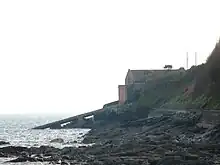Mousehole
| |
|---|---|
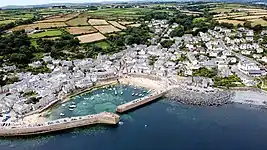 Mousehole Harbour | |
 Mousehole Location within Cornwall | |
| Population | 697 (2011 Census) |
| OS grid reference | SW468264 |
| Civil parish | |
| Unitary authority | |
| Ceremonial county | |
| Region | |
| Country | England |
| Sovereign state | United Kingdom |
| Post town | PENZANCE |
| Postcode district | TR19 |
| Dialling code | 01736 |
| Police | Devon and Cornwall |
| Fire | Cornwall |
| Ambulance | South Western |
| UK Parliament | |
Mousehole (/ˈmaʊzəl/; Cornish: Porthenys) is a village and fishing port in Cornwall, England, UK.[1] It is approximately 2.5 miles (4 km) south of Penzance on the shore of Mount's Bay.[2] The village is in the civil parish of Penzance. An islet called St Clement's Isle lies about 350 metres (380 yd) offshore from the harbour entrance.
Mousehole lies within the Cornwall Area of Outstanding Natural Beauty (AONB). 27% of Cornwall has AONB designation, with the same status and protection as a National Park.
History
The first mention of the village of Mousehole is in 1283 and the first mention of Portheness is in 1267. Although usually thought of as the same place, a document from 1309 names Porthenys juxta Mousehole (i.e. next to Mousehole), implying two separate places. Compare with nearby Newlyn which is separated by a stream from Tolcarne and both were once considered individual places. There is also a 1339 document naming Porthengrous juxta Porthenes (harbour by the cross, next to the harbour by the island).[3][4] If the amount of tax collected is indicative of how important a place was, in the 14th century, tax collected on the number of fishing boats from Mousehole was £5. Nearby Marazion paid £1 6s 8d, Newlyn £1, Penzance 12s and Porthgwarra and Penberth 12s.[3] There were three medieval chapels, including the one on St Clement's island. In 1383 a chapel was dedicated to ″the Blessed Virgin Mary″ and was in ruins by 1414 due to storms. It was rebuilt around 1420 and finally destroyed during the Reformation. Another chapel was licensed in 1441 and dedicated to St Edward the Confessor.[3]
Records show that pilchards were exported to France as early as 1302, and in the late 18th century there were five seines and 55 boats based in the harbour.[5][6] In the 1880s there was still a drift pilchard fishery and in the autumn around sixty boats fished in the North Sea.[7]
Along with Marazion, it was until the 16th century one of the principal ports of Mount's Bay. Before its decline as a major commercial centre, Mousehole also had a number of fairs and markets, including the charter for a market on Tuesdays, with a fair for three days at the festival of St Barnabas, granted to Henry de Tyes in 1292.[8] Mousehole, like many communities in Mount's Bay, fell within the authority of the Manor of Alverton; all early charters, fairs etc. associated with Mousehole are associated with this manorial estate.
Mousehole, like Penzance, Newlyn and Paul, was attacked in the 1595 raid on Mount's Bay by Spaniard Carlos de Amésquita, the only surviving building being the 'Keigwin Arms', a local pub. Outside the Keigwin Arms (now a private residence) is a plaque with the wording "Squire Jenkyn Keigwin was killed here 23 July 1595 defending this house against the Spaniards".[9]
20th century
Although a lifeboat had been available in Mount's Bay for many years, a new lifeboat station at Penlee Point, on the outskirts of the village, was opened in 1913. On 19 December 1981 the entire lifeboat crew of eight was lost during an attempted rescue in hurricane-force winds.[10] The lifeboat was moved to Newlyn in 1983 but continues to be known as the 'Penlee Lifeboat'.[11]
The village's harbourside was once the location of the Lobster Pot guest house, in which Dylan Thomas and Caitlin Macnamara spent their honeymoon after marrying at Penzance register office.[12]
In 1936 the GPO Film Unit made The Saving of Bill Blewitt, a short film to promote the Post Office Savings Bank, featuring local postman Bill Blewitt.[13]
_2014.jpg.webp)

Mousehole hosts a vibrant variety of festivals and community activities. It is known for its Christmas illuminations. Since 1981, every 19 December the lights have been turned off in memory of the victims of the lifeboat disaster. Tom Bawcock's Eve is a unique celebration held on 23 December each year to celebrate the ending of a famine in the 16th century by local resident Tom Bawcock. This festival is the inspiration behind the book The Mousehole Cat by Antonia Barber and the associated television productions. This festival is also the origin of 'Star Gazey Pie', a mixed fish, egg and potato pie with fish heads protruding through the pastry. Mousehole also holds a small maritime festival every two years called 'Sea, Salt and Sail'.[15]
Parts of the 1995 feature film Blue Juice were filmed in the village. The local community radio station is Coast FM (formerly Penwith Radio), which broadcasts on 96.5 and 97.2 FM.[16]
Local government
Mousehole was part of the ancient parish of Paul, and from 1866 part of the civil parish of Paul. In 1894 Mousehole became part of Paul Urban District. The urban district was abolished in 1934 and Mousehole was absorbed into the municipal borough of Penzance.[17] Penzance Municipal Borough was itself abolished in 1974 under the Local Government Act 1972, and Mousehole became part of the new Penwith District. The former borough was unparished until 1980. The unparished area was formed into a civil parish in 1980,[18] and the new Penzance parish council elected to call itself a town council. Penwith District was abolished in 2009, and Mousehole now falls under the unitary Cornwall Council.
Sport
There is a football team based nearby named Mousehole A.F.C., currently playing in the Premier Division of the Western Football League.
Notable residents

Penwith is believed to be the last part of Cornwall where the Cornish language was spoken as the community language. Dolly Pentreath, popularly known as the last recorded speaker of Cornish, is often reported as being from Mousehole and as having a memorial in the village. In fact, she was from Paul (the parish of Paul historically included Mousehole).
A year after Dolly Pentreath died in 1777, Daines Barrington received a letter, written in Cornish and accompanied by an English translation, from a fisherman in Mousehole named William Bodinar stating that he knew of five people who could speak Cornish in that village alone. Barrington also speaks of a John Nancarrow from Marazion who was a native speaker and survived into the 1790s.[19]
John Keigwin (1641–1716), a scholar in the Cornish language,[20] William Carvosso (1750–1834), the Methodist,[21] and Joseph Trewavas VC CGM (14 December 1835 – 20 July 1905) were also born in Mousehole.[22]
Admiral of the fleet Sir Caspar John GCB (1903–1984) lived in Mousehole in retirement. The artist Jack Pender (1918–1998) was born in Mousehole and spent most of his career there. English writer and illustrator Michelle Cartlidge lives in Mousehole.[23]
The potter Jack Doherty lives in Mousehole where he has his studio.[24]
Media and literary associations
- Charles de Lint, writer of many modern and urban fairy tales, set his novel The Little Country in the village of Mousehole.[25]
- The Mousehole Cat, a children's book written by Antonia Barber and illustrated by Nicola Bayley, is also set in Mousehole and based on the legend of Tom Bawcock and the continuing tradition of Tom Bawcock's Eve.
- The local community radio station is Coast FM (formerly Penwith Radio), which broadcasts on 96.5 and 97.2 FM.[16]
- Mark Jenkin's film, Bait, was filmed in Mousehole. Bait tells the story of a fisherman battling to keep his way of life afloat in the face of gentrification.
Gallery
 Aerial shot
Aerial shot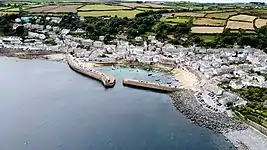 Aerial shot
Aerial shot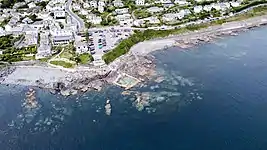 Aerial shot of rock pool
Aerial shot of rock pool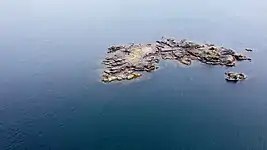 St Clements Isle
St Clements Isle
References
- ↑ "Must see fishing villages in Cornwall". Travel Daily News. Archived from the original on 7 September 2012. Retrieved 13 May 2015.
- ↑ Ordnance Survey: Landranger map sheet 203 Land's End ISBN 978-0-319-23148-7
- 1 2 3 Cooke, Ian McNeil (2001). Crosses and Churchway Paths in the Land's End Peninsula, West Cornwall. Parishes of Paul & Sancreed. Bosullow: Men-an-Tol Studio. pp. 9–10.
- ↑ Pool, Peter A S (1985). The Place-Names of West Penwith (Second ed.). Heamoor: Peter Pool. p. 59 & 65.
- ↑ Lenton, W Stewart (2006). The fishing boats and ports of Cornwall: An alternative way to explore Cornwall. Plymouth: Channel View Publishing. ISBN 0955402301.
- ↑ Pender, Nellie Mann; Pender, Jack (1970). A short history of Mousehole: with personal recollections. Mousehole: N M Pender. ISBN 0950147206.
- ↑ "Mousehole". The Cornishman. No. 223. 19 October 1882. p. 4.
- ↑ "West Penwith Resources – Paul (Lysons)". West-penwith.org.uk. 18 October 2003. Retrieved 19 December 2018.
- ↑ Thomson, Lizzie (21 March 2022). "Only house in village to survive Spanish Armada shelling up for sale". Metro. Retrieved 21 March 2022.
- ↑ "Solomon Browne history". BBC. 27 September 2010. Retrieved 3 December 2010.
- ↑ Leach, Nicholas (2006) [2000]. Cornwall's Lifeboat Heritage. Chacewater: Twelveheads Press. pp. 41–42. ISBN 0-906294-43-6.
- ↑ "City and County of Swansea – The 1930s". Dylanthomas.com. 25 October 2010. Archived from the original on 28 September 2007. Retrieved 15 October 2013.
- ↑ Anthony, Scott. "BFI Screenonline: Saving of Bill Blewitt, The (1936)". BFI. Retrieved 18 December 2017.
- ↑ An 18th-century building which was heightened in the 19th century and has whitewashed rubble walls with tarred plinth. One of the four windows is blocked the others have sashes without glazing bars. On the first floor is an oriel bay and th plain recessed door is under a bay window. The right hand part of the building is from the early 19th-century, of two storeys and has four windows which have sashes without glazing bars. The slurried roof has large slates and wide eaves.
- ↑ "Home". Seasalts.co.uk. Retrieved 15 October 2013.
- 1 2 "Volunteer run Penwith Radio to change its name to Coast FM". falmouthpacket.co.uk. Retrieved 4 February 2017.
- ↑ Vision of Britain website: Paul UD
- ↑ "A complete list of orders affecting Cornwall County from 1973 to the present". Database of Local Government Orders. Local Government Boundary Commission for England. Retrieved 7 June 2012.
- ↑ Ellis, P. Berresford (c. 1970) The Story of the Cornish Language. Penryn: Tor Mark Press
- ↑ "Keigwin, John". Oxford Dictionary of National Biography (online ed.). Oxford University Press. 2004. doi:10.1093/ref:odnb/15253. Retrieved 18 February 2021. (Subscription or UK public library membership required.)
- ↑ "William Carvosso". UK Wells. Retrieved 18 February 2021.
- ↑ "A CEREMONY TO UNVEIL A MEMORIAL PLAQUE TO JOSEPH TREWAVAS VC, CGM, RN, TOOK PLACE AT ST POL DE LEON CHURCH, PAUL VILLAGE, CORNWALL". VictoriaCross.org.uk. 26 June 2002. Retrieved 18 February 2021.
- ↑ "Michelle Cartlidge". Mabecronbooks.co.uk. Archived from the original on 1 April 2018. Retrieved 15 October 2013.
- ↑ "Jack Doherty | Bils & Rye Ltd". contemporarysculpture.gallery. Retrieved 18 February 2022.
- ↑ Lint, Charles de (7 April 2001). The Little Country. ISBN 0312876491.
External links
 The dictionary definition of mousehole at Wiktionary
The dictionary definition of mousehole at Wiktionary- Cornwall Record Office Online Catalogue for Mousehole
- Mousehole at Curlie
